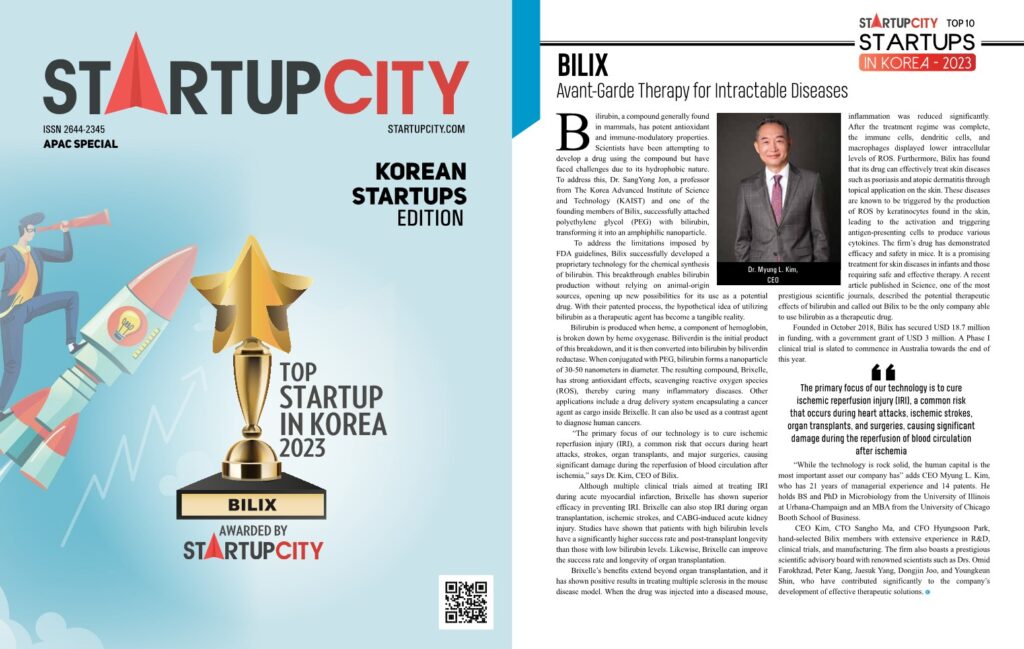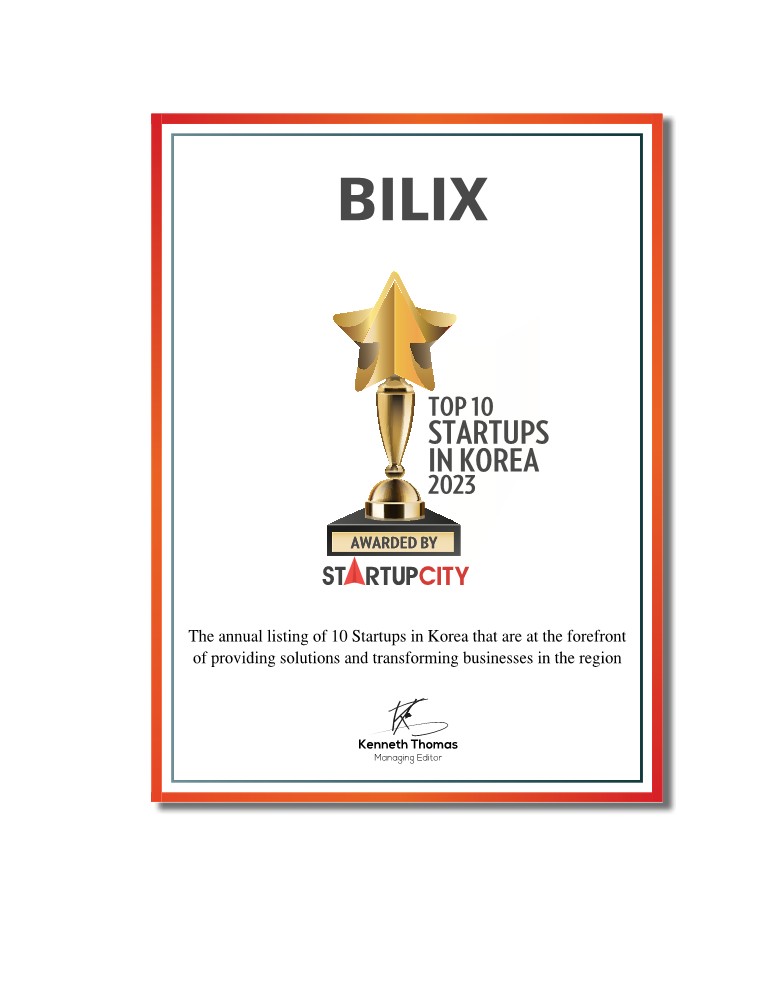
Bilirubin, a compound generally found in mammals, has potent antioxidant and immune-modulatory properties. Scientists have been attempting to develop a drug using the compound but have faced challenges due to its hydrophobic nature. To address this, Dr. SangYong Jon, a professor from The Korea Advanced Institute of Science and Technology (KAIST) and one of the founding members of Bilix, successfully attached polyethylene glycol (PEG) with bilirubin, transforming it into an amphiphilic nanoparticle.
To address the limitations imposed by FDA guidelines, Bilix successfully developed a proprietary technology for the chemical synthesis of bilirubin. This breakthrough enables bilirubin production without relying on animal-origin sources, opening up new possibilities for its use as a potential drug. With their patented process, the hypothetical idea of utilizing bilirubin as a therapeutic agent has become a tangible reality.
Bilirubin is produced when heme, a component of hemoglobin, is broken down by heme oxygenase. Biliverdin is the initial product of this breakdown, and it is then converted into bilirubin by biliverdin reductase. When conjugated with PEG, bilirubin forms a nanoparticle of 30-50 nanometers in diameter. The resulting compound, Brixelle, has strong antioxidant effects, scavenging reactive oxygen species (ROS), thereby curing many inflammatory diseases. Other applications include a drug delivery system encapsulating a cancer agent as cargo inside Brixelle. It can also be used as a contrast agent to diagnose human cancers.
“The primary focus of our technology is to cure ischemic reperfusion injury (IRI), a common risk that occurs during heart attacks, strokes, organ transplants, and major surgeries, causing significant damage during the reperfusion of blood circulation after ischemia,” says Dr. Kim, CEO of Bilix.
Although multiple clinical trials aimed at treating IRI during acute myocardial infarction, Brixelle has shown superior efficacy in preventing IRI. Brixelle can also stop IRI during organ transplantation, ischemic strokes, and CABG-induced acute kidney injury. Studies have shown that patients with high bilirubin levels have a significantly higher success rate and post-transplant longevity than those with low bilirubin levels. Likewise, Brixelle can improve the success rate and longevity of organ transplantation.
Brixelle’s benefits extend beyond organ transplantation, and it has shown positive results in treating multiple sclerosis in the mouse disease model. When the drug was injected into a diseased mouse, inflammation was reduced significantly. After the treatment regime was complete, the immune cells, dendritic cells, and macrophages displayed lower intracellular levels of ROS. Furthermore, Bilix has found that its drug can effectively treat skin diseases such as psoriasis and atopic dermatitis through topical application on the skin. These diseases are known to be triggered by the production of ROS by keratinocytes found in the skin, leading to the activation and triggering antigen-presenting cells to produce various cytokines. The firm’s drug has demonstrated efficacy and safety in mice. It is a promising treatment for skin diseases in infants and those requiring safe and effective therapy. A recent article published in Science, one of the most prestigious scientific journals, described the potential therapeutic effects of bilirubin and called out Bilix to be the only company able to use bilirubin as a therapeutic drug.
The primary focus of our technology is to cure ischemic reperfusion injury (IRI), a common risk that occurs during heart attacks, ischemic strokes, organ transplants, and surgeries, causing significant damage during the reperfusion of blood circulation after ischemia
Founded in October 2018, Bilix has secured USD 18.7 million in funding, with a government grant of USD 3 million. A Phase I clinical trial is slated to commence in Australia towards the end of this year.
“While the technology is rock solid, the human capital is the most important asset our company has” adds CEO Myung L. Kim, who has 21 years of managerial experience and 14 patents. He holds BS and PhD in Microbiology from the University of Illinois at Urbana-Champaign and an MBA from the University of Chicago Booth School of Business.
CEO Kim, CTO Sangho Ma, and CFO Hyungsoon Park, hand-selected Bilix members with extensive experience in R&D, clinical trials, and manufacturing. The firm also boasts a prestigious scientific advisory board with renowned scientists such as Drs. Omid Farokhzad, Peter Kang, Jaesuk Yang, Dongjin Joo, and Youngkeun Shin, who have contributed significantly to the company’s development of effective therapeutic solutions.


[원문보기]
STARTUP CITY(https://www.startupcity.com/)